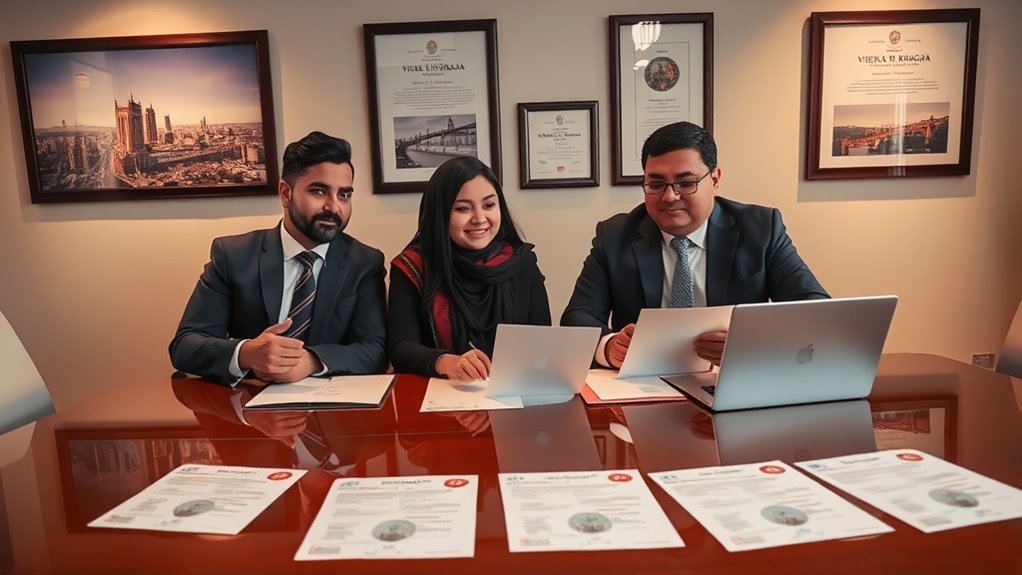If you’re an Afghan entrepreneur exploring partner visa or investor pathways, you’ll quickly notice how complex the process can be. Each regulation brings its own set of challenges, especially as rules and requirements shift. Vieira Braga Advogados brings clarity by assessing your unique situation and focusing on what matters—genuine relationships and solid financial planning. Before you take the next step toward your business goals abroad, you might want to know the pitfalls that catch most people off guard.
Understanding Partner Visa Options for Afghan Nationals

Wondering how Afghan nationals can join their loved ones abroad? If you’re in this situation, partner visa options are a direct route to reunification. You’ll need to demonstrate a genuine relationship with your partner, who’s usually a citizen or permanent resident in the destination country. Authorities typically require clear evidence, like shared finances, communication records, and even travel together. Each country can set its own requirements, so it’s crucial to research specific rules for your chosen destination.
You’ll apply by providing personal documents, proof of relationship, and often medical or police checks. Timing matters—applications can take several months or longer to process, especially for Afghan nationals facing complex circumstances. If you’re married, engaged, or in a committed partnership, you could qualify under different categories. Make sure you prepare all documentation thoroughly to avoid unnecessary delays or complications and maximize your chances of joining your partner legally and quickly. Consulting with an immigration lawyer can help you understand the specific documentation and maximize your success when applying for a partner visa.
Investor Visa Programs: Key Requirements and Opportunities
Several countries offer investor visa programs that can open doors for Afghan entrepreneurs seeking new opportunities abroad. If you’re considering expanding your business or securing a future for your family, understanding the essentials of these visas is key. Investor visa programs typically require significant financial commitments, but they reward you with residency rights or even eventual citizenship, depending on your chosen destination.
Here’s what you should focus on when exploring investor visa options:
- Minimum investment amounts: Countries set different thresholds, from $100,000 to over $2 million, depending on the program and location.
- Eligible investment types: You might need to invest in real estate, government bonds, or start a qualifying business.
- Job creation obligations: Some programs mandate that your investment generates a certain number of local jobs.
- Physical residence requirements: Some visas require you to live in the country for a minimum period each year.
You should also be prepared for detailed documentation requirements to prove the origin of your investment funds and demonstrate compliance with local regulations.
Common Pitfalls When Applying for Business Migration Routes

Although business migration routes offer exciting prospects, many applicants stumble over common obstacles that can jeopardize their success. If you underestimate requirements or overlook crucial paperwork, you risk delays or rejection. Let’s spotlight frequent missteps so you can steer clear of unnecessary setbacks on your journey.
Here’s a quick table summarizing typical pitfalls, their impact, and how you can avoid them:
| Pitfall | Impact | How to Avoid |
|---|---|---|
| Inadequate Documentation | Application Rejection | Double-check all forms |
| Insufficient Investment | Ineligibility | Confirm minimum amounts |
| Poor Business Plan | Reduced Credibility | Provide detailed strategy |
| Ignoring Deadlines | Missed Opportunity | Set calendar reminders |
| Lack of Legal Guidance | Costly Mistakes | Consult migration experts |
If you’re diligent and proactive, you can sidestep these errors. Pay close attention to instructions, document every step, and don’t hesitate to ask for professional support when needed. This disciplined approach will increase your chances of a successful application. Careful attention to required documentation and precise investment figures is especially vital for securing approval when pursuing U.S. business migration pathways.
Family Reunification Strategies for Afghan Entrepreneurs
While navigating new business opportunities abroad, you might be concerned about bringing your loved ones with you. Family reunification is a top priority for Afghan entrepreneurs, and understanding the right strategies ensures your family can join and support you throughout your journey. Proactive planning and the right documentation will strengthen your case and ease the process.
To make reunification more approachable, keep these strategies in mind:
- Review eligibility criteria: Check the family member definitions and ensure everyone meets the required relationship evidence.
- Prepare thorough documentation: Gather marriage, birth, and dependency documents early, translating and certifying them as needed.
- Coordinate timing: Submit family applications alongside your main visa where possible to minimize separation.
- Consider long-term pathways: Explore options for dependent visas or, eventually, permanent residency for your family.
Seeking guidance from an experienced immigration lawyer can help prevent visa denials and ensure that your family’s application is legally compliant from the start. Your family’s presence can greatly influence your settling-in process and enhance your entrepreneurial success in a new country.
Latest Regulatory Changes and Their Impact on Afghan Applicants

Because immigration policies frequently change, staying informed about the latest regulatory updates is crucial if you’re an Afghan entrepreneur looking to expand or relocate. Recent adjustments in partner visa categories and investor requirements will directly influence the way you plan your migration strategy. Quotas for investor visas, financial thresholds, and required documentation may now look different from what you expected. For Afghan nationals, these shifts can affect processing times, eligibility, and even the points awarded for entrepreneurial skills.
Below is a table that illustrates current changes and their impact on Afghan applicants:
| Change | Impact on Applicants |
|---|---|
| Higher Financial Bar | Increased investment required |
| English Requirement | Stricter language proficiency tests |
| Priority Processing | Shorter wait for qualified cases |
| Documentation Rules | More rigorous background checks |
Seeking advice from experienced immigration professionals can help Afghan entrepreneurs avoid common application process errors and improve their chances of success.
Keep a close watch on these developments, as prompt action can help you seize opportunities or avoid setbacks in your immigration journey.
Frequently Asked Questions
How Long Do Visa Processing Times Usually Take for Afghan Entrepreneurs?
Visa processing times for Afghan entrepreneurs usually vary depending on the specific visa program, country, and current governmental workload. In general, you might expect the process to take anywhere from several months to over a year. It’s smart to prepare all your documents in advance and respond promptly to any requests from immigration authorities. By staying proactive and organized, you can help prevent unnecessary delays and keep your application moving forward efficiently.
What Languages Are Support Services Available in During the Application Process?
You’ll typically find support services available in English, but many immigration offices and legal advisors also offer help in languages like Dari, Pashto, and sometimes Arabic or Farsi, depending on your location and the service provider. You should always check with your visa consultant or the official government website to confirm which languages they support. Translation and interpretation services can bridge gaps if you need help during the application process, so don’t hesitate to ask.
Are There Networking Opportunities for Afghan Investors in the Destination Country?
Yes, you’ll find networking opportunities for Afghan investors in the destination country. Organizations, business associations, and chambers of commerce often host events designed to connect new investors with local business communities. You can also join industry seminars and workshops where you’ll meet other entrepreneurs and gain insights about local market trends. Take advantage of online forums and social media groups to expand your connections and share experiences with other business professionals.
What Is the Success Rate of Visa Applications for Afghan Businesspersons?
You’ll find that the success rate for visa applications by Afghan businesspersons varies widely depending on the destination country, the specific visa category, and your supporting documentation. Generally, success rates for business or investor visas are higher when you provide strong financial records, a clear business plan, and proof of ties to your homeland. It’s crucial to consult with immigration experts and thoroughly prepare your application to increase your chances of approval.
Can Afghan Entrepreneurs Retain Dual Citizenship After Migration?
Yes, you can often retain dual citizenship after migrating, but it depends on the laws of both Afghanistan and your new country. Afghanistan technically doesn’t recognize dual citizenship officially, but many Afghans do hold two passports. Your ability to keep dual citizenship also relies on whether your new country permits it. Before making decisions, you should always check the specific regulations, as some countries require you to renounce your previous citizenship.
Conclusion
If you’re an Afghan entrepreneur aiming for a partner or investor visa, trust Vieira Braga Advogados to guide you every step of the way. They’ll help you avoid common mistakes, keep you updated on the latest regulatory changes, and make sure your application meets every requirement. With their expertise, you’ll boost your chances of reuniting with family and launching your business abroad. Don’t navigate these complex pathways alone—let experienced professionals support your journey.

